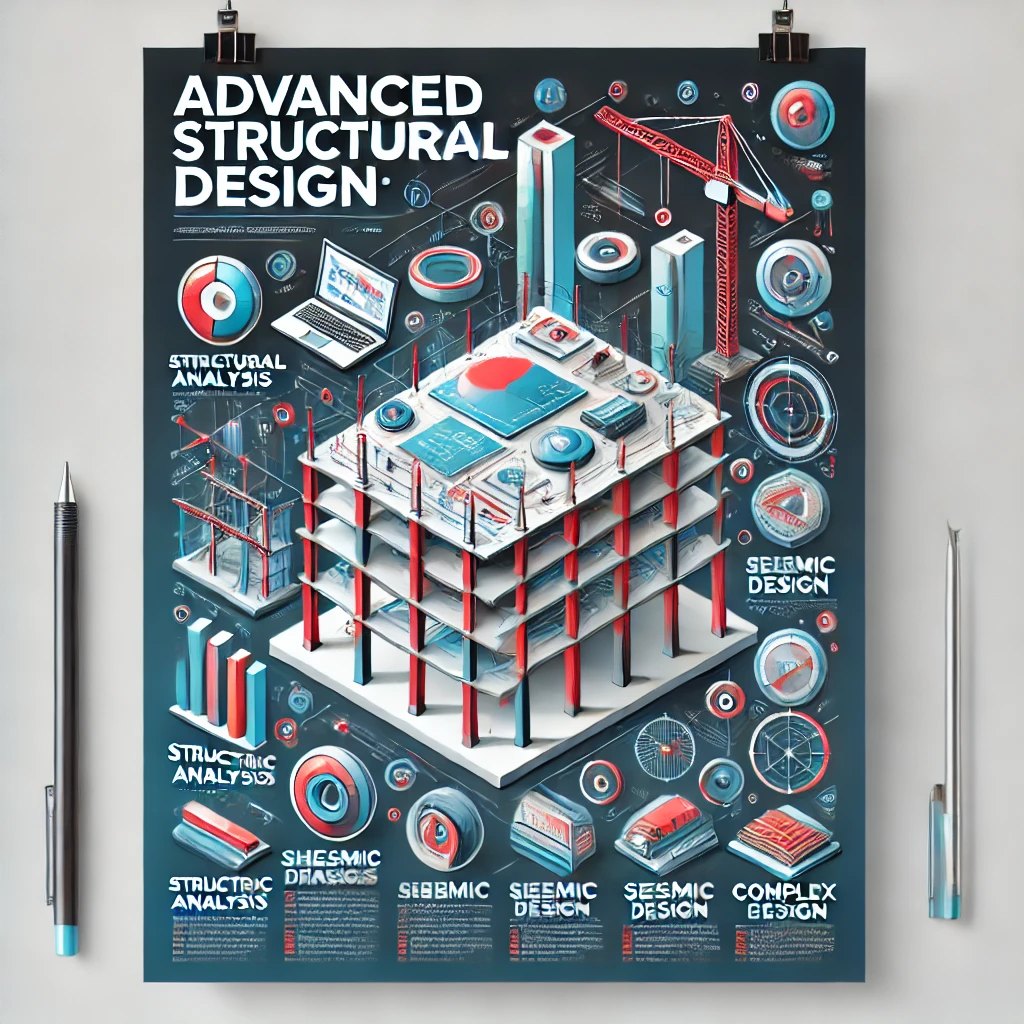
About Course
🏗️ Advanced Structural Design
Course Code: 3020-ARC
Title: Advanced Structural Design – Analysis and Simulation of Complex Architectural Structures
📘 Course Introduction
This advanced-level course provides a comprehensive understanding of modern structural design techniques for complex architectural forms. It integrates theoretical foundations with practical applications, preparing professionals to tackle real-world challenges using cutting-edge analysis tools and sustainable practices.
📘 Course Description
This advanced course explores the principles and practices of designing complex structural systems in modern architecture. It covers advanced load analysis (including wind, seismic, and dynamic forces), high-performance materials, and structural simulation using state-of-the-art tools. Engineers, architects, and advanced students will engage in real-world scenarios that bridge theory with practical design, with a strong focus on safety, innovation, and sustainability.
Participants will utilize software like SAP2000, ANSYS, and ETABS to simulate, analyze, and verify structural performance, culminating in a capstone project where learners develop a fully engineered solution for a sophisticated building structure.
📚 Detailed Course Outlines
Module 1: Introduction to Advanced Structural Design
-
Overview of traditional vs. advanced structural approaches
-
Key challenges in complex architectural structures
-
Role of structural engineers in multidisciplinary teams
Module 2: Structural Load Analysis
-
Load types: dead, live, wind, seismic, thermal, snow
-
Dynamic and transient loading
-
Load combinations and factors of safety
-
National and international codes: ACI, Eurocode, ASCE
Module 3: Design with High-Performance Materials
-
Properties and applications of:
-
High-strength concrete (HSC)
-
Fiber-reinforced concrete (FRC)
-
High-tensile steel (HTS)
-
-
Behavior under extreme loads
-
Material selection for architectural needs
Module 4: Simulation and Modeling Tools
-
Introduction to SAP2000, ETABS, ANSYS Workbench
-
Finite Element Modeling (FEM) techniques
-
Modal and frequency analysis
-
Load path visualization and stress mapping
Module 5: Safety, Codes & Sustainability
-
Design for resilience (earthquake-resistant design)
-
Performance-based engineering
-
Energy efficiency and structural sustainability
-
Green building considerations and LEED relevance
Module 6: Structural Optimization & Innovation
-
Structural systems for high-rise and irregular buildings
-
Lightweight structures and long-span systems
-
Parametric and generative structural design
-
Value engineering and cost-efficiency strategies
Module 7: Practical Applications
-
Industry case studies (bridges, towers, stadiums)
-
Peer review of project progress
-
Troubleshooting complex design issues
-
Team collaboration techniques
Module 8: Capstone Project
-
Design and simulate a complete structural system
-
Submit full calculation sheets, CAD drawings, and simulation reports
-
Present final project to jury panel or instructor for feedback
🎓 Target Audience
-
Structural and civil engineers seeking advanced design skills
-
Architects collaborating with structural teams
-
Graduate students in architecture or engineering fields
-
BIM and simulation specialists looking to expand into structural analysis
-
Professionals preparing for real-world multidisciplinary projects
🕒 Time Frame
-
Duration: 8 weeks
-
Effort: 5–6 hours per week
-
Structure:
-
6 weeks: core modules
-
1 week: simulation workshops
-
1 week: final project submission and presentation
-
🧭 Instruction Format
-
Delivery: Online / Hybrid / In-person (flexible)
-
Includes:
-
Pre-recorded expert video sessions
-
Hands-on simulation labs
-
Weekly assignments and quizzes
-
Live Q&A and design critique sessions
-
Downloadable references and guides
-
Capstone mentorship and feedback
-
🎯 What You Will Learn
-
Perform advanced structural analysis under dynamic and environmental loads.
-
Design using high-performance materials like fiber-reinforced concrete and high-strength steel.
-
Utilize simulation software such as SAP2000 and ANSYS for structural modeling.
-
Apply safety and sustainability standards in modern structural systems.
-
Execute a capstone project: structural design of a complex architectural form.
📅 Time Frame
-
Duration: 8 weeks
-
Study Time: Approx. 5–6 hours/week
-
Final Project: Week 8 – Structural design submission and presentation
🖥️ Course Format
-
Online or hybrid (depending on the institution)
-
Weekly video lectures and readings
-
Practical exercises using engineering software
-
Interactive discussion forums
-
Final project with feedback and evaluation
📦 Materials Included
-
Course Manual (PDF) – theory, design procedures, codes
-
Video Lectures – HD recordings with real-case walkthroughs
-
Software Tutorials – SAP2000, ANSYS (simulation exercises)
-
Design Templates – structural drawings, load calculations
-
Case Studies – analysis of real complex structures
-
Quizzes & Assignments – reinforce learning after each unit
-
Capstone Project Brief – Design a structure with performance criteria
-
Reference Codes & Standards – ACI, Eurocode, ASCE excerpts
-
Certificate of Completion – Issued after final project approval
✅ Outcomes
By the end of the course, participants will:
-
Master structural analysis techniques for irregular and high-performance buildings.
-
Design safe and sustainable structural systems for architectural innovation.
-
Build confidence in using engineering software for professional practice.
-
Present structural design proposals with clarity and technical accuracy.
Course Content
🏗️ Advanced Structural Design
Student Ratings & Reviews



